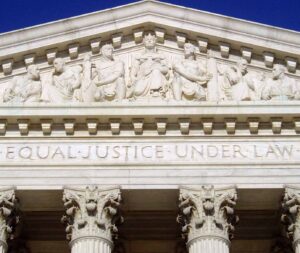Back in 1974, when he pardoned Richard Nixon, Gerald Ford committed one of the most heinous acts in the history of the United States.
All through the Watergate saga — from the day after the break-in, when no one had a clue that the President might be directly involved; through the investigations and prosecutions and Congressional hearings; all the way up to Nixon’s resignation in disgrace — throughout that entire time, a single mantra sounded across the country:
“No person is above the law, not even the President of the United States.”
The news media repeated it. Politicians of all stripes repeated it. Lawyers and Constitutional scholars repeated it. The United States was a country of laws, not of men. If someone committed a crime, no matter how rich or poor or weak or powerful they were, they would be held accountable. Each would be held to the same standard of justice as everyone else.
But with a stroke of his pen on September 8, 1974, Gerald Rudolph Ford proved the cynics correct and the idealists wrong. Moreover, he turned uncounted more believers and idealists into cynics themselves. Under the guise of “healing” the nation, Ford demonstrated without any shadow of a doubt that the laws did not apply equally to everyone. He proved conclusively that some people are indeed above the law.
That moment almost 50 years ago is becoming increasingly relevant again now. As more and more information comes out about the attempted coup led by ex-President Donald Trump, and his deep involvement in that entire conspiracy, questions once again arise about criminal culpability and equal justice at the highest levels of power.
Interestingly, the nation does not seem to have learned much from the Nixon/Ford experience. Or perhaps it’s the other way around: perhaps the nation has learned too well.
No longer is there the repeating mantra of “No person is above the law” wafting across the countryside. Now, instead, there are reports of “doubt” and of “indecision” and of “reluctance” on the part of the Attorney General and the Department of Justice to prosecute Trump, even if there is clear evidence of his criminality. They worry about political consequences. They worry about further dividing an already divided nation. They worry about setting a precedent.
When what they should be worrying about is a concept that is admittedly naive and idealistic, but also eminently powerful: “No person is above the law, not even the President of the United States.”
Gerald Ford taught Americans two lessons. One, that some people are, in fact, above the law. And two, that “healing” does not occur without full closure. And full closure means seeing the process all the way through to its ultimate conclusion, even if it is distasteful or painful along the way.
At least that way, whatever the eventual outcome, the process of seeking truth and justice has been allowed to run its full and proper course, rather than being artificially short-circuited by someone who thinks he knows what’s best for everyone, regardless of ideals and principles.
The Justice Department is worried about setting a precedent. They should instead worry about reaffirming the bad precedent set by Gerald Ford, and instead welcome the opportunity to set a new precedent that demonstrates in concrete form the ideal that no person is above the law. Not even the President of the United States.
Photo: UpstateNYer – https://en.wikipedia.org/wiki/File:CourtEqualJustice.JPG, CC BY-SA 3.0, https://commons.wikimedia.org/w/index.php?curid=26397742

